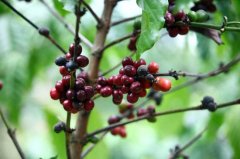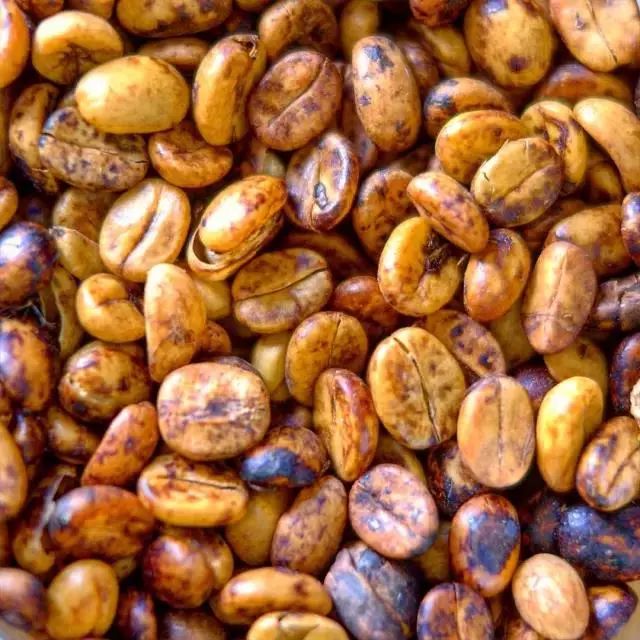Guatemala Vivette Nango-Limonar Manor Baking suggestion, Cup Test score
Professional barista communication, please pay attention to coffee workshop (Weixin Official Accounts cafe_style )

Vivitenango (SHB)-Limonar Estate, Guatemala
Coffee is the most important economic income of Guatemala. About 125,000 people are engaged in the production of coffee, which accounts for 40% of the total export income. Coffee beans are grown in almost all regions of the country. Coffee grows in the cloud belt at high altitude. Therefore, the climatic conditions with large temperature difference between morning and evening make coffee grow not too fast.(Because the coffee grows too fast, it will make the coffee soft and bland). In addition, the fertile volcanic soil and abundant rainfall make the coffee planting conditions the most ideal among the Central American countries. Unlike the coffee beans produced in other Central American countries, the coffee flavor is relatively clean and refreshing. Guatemala coffee has many changes due to different coffee styles at different altitudes. The capital Antigua and the northwest Viente South fruit plateau are the two major producing areas. These two regions account for almost all of Manchu's impressions of Guatemala coffee, with Antigua coffee having a better intensity and subtle smoky flavor, while Vivitenango Highlands is characterized by fine citrus acids.
Vivitenango is a coffee town in western Guatemala. It is increasingly famous for its delicate fruit acid and unique chamomile taste. The champion estates for three consecutive years from 2007 to 2010 come from El Injerto Estate on this plateau. Most of the coffee is planted by local residents themselves, so coffee farms have a certain history.
The new harvest in 2010, Vivienne Nango Limonar ( Limonar) estate was established in 1955 is located in the mountains of tropical rain forest at an altitude of 1850 meters, coffee species are mainly Bourbon and Kadura species, coffee harvest immediately after the fermentation process of 48~72 hours, after 7 days to natural sun drying, and then manually selected, is the winner of the 2004 coffee competition estate.
Vivetnam fruit Limonar estate beans, bean-shaped, full-sized, hand-selected, first-class beans
Light Bake End (City): After grinding, it has the aroma of peanut nuts. After brewing, it emits the fragrance of chamomile flowers. The taste is particularly coarse and will bring a little grainy feeling but will not form discomfort. The delicate citrus acid has strength and thickness. The sweetness is the grain sweetness of wheat tea. The aftertaste has the sweetness of soft candy. Full City-60 seconds: The ground wood cork has a unique taste, which will be absorbed by the special air-dried orange acid. This is the most special Vivetnam coffee. The taste is soft and smooth but complex. The sweetness of peaches and pears rises slowly. At this time, the unique smoky taste of Guatemala coffee begins to produce, and the sweet taste of cotton candy surrounds the mouth. Full City: coffee ground with mint chocolate aroma, brewed caramel sweet after cooling with citrus sour sweet, delicate smoky taste unlike Antigua coffee without modification, special brown sugar sweet aftertaste with a thin layer of chocolate aroma.

Date of cup test: August 14, 2010
Dry aroma: 9
Wet aroma: 8
Clean: 7
Brightness: 7
Taste: 8
Balance: 9
Complexity: 9
Sweet: 10
Acid: 9
Aftermath: 9
Cup score: 85
Overall comments: Guatemala Vivienne is a region that produces good coffee unforgettable is not all Central American coffee, if the coffee classification Vivienne can be independent of Central American countries, in the taste and acidity of the complex jump off Central American clean smooth style to form an independent Vivienne coffee, it is a bit out of place to classify Guatemala coffee.
Important Notice :
前街咖啡 FrontStreet Coffee has moved to new addredd:
FrontStreet Coffee Address: 315,Donghua East Road,GuangZhou
Tel:020 38364473
- Prev

Suggestion and cup score of bean baking in Panamaria Manor of Kaisalouis Cooperative in Panama
For the exchange of professional baristas, please follow the coffee workshop (Wechat official account cafe_style) Panamanian Casa Ruiz cooperative Panamaria manor beans Panamanian coffee is the hottest country in Central America in the past five to six years, mainly because of a coffee tree species G grown in the Panamanian Emerald Manor (Hacienda La Esmeralda) run by the Peterson family.
- Next

Costa Rican Shumawa black honey treats coffee beans with rich nutty flavor
For the exchange of professional baristas, please pay attention to the coffee workshop (Wechat official account cafe_style) Costa Rica-Rosa Manor Costa Rica coffee is of the most stable quality in Central America, mainly because it grows in the complete shade of big trees and in the natural environment of cool rainy night and large temperature difference in the morning and evening, coupled with rich soil and stable and progressive treatment in the middle and later stages.
Related
- Does Rose Summer choose Blue, Green or Red? Detailed explanation of Rose Summer Coffee plots and Classification in Panamanian Jade Manor
- What is the difference between the origin, producing area, processing plant, cooperative and manor of coffee beans?
- How fine does the espresso powder fit? how to grind the espresso?
- Sca coffee roasting degree color card coffee roasting degree 8 roasting color values what do you mean?
- The practice of lattes: how to make lattes at home
- Introduction to Indonesian Fine Coffee beans-- Java Coffee producing area of Indonesian Arabica Coffee
- How much will the flavor of light and medium roasted rose summer be expressed? What baking level is rose summer suitable for?
- Introduction to the characteristics of washing, sun-drying or wet-planing coffee commonly used in Mantenin, Indonesia
- Price characteristics of Arabica Coffee Bean Starbucks introduction to Manning Coffee Bean Taste producing area Variety Manor
- What is the authentic Yega flavor? What are the flavor characteristics of the really excellent Yejasuffi coffee beans?

